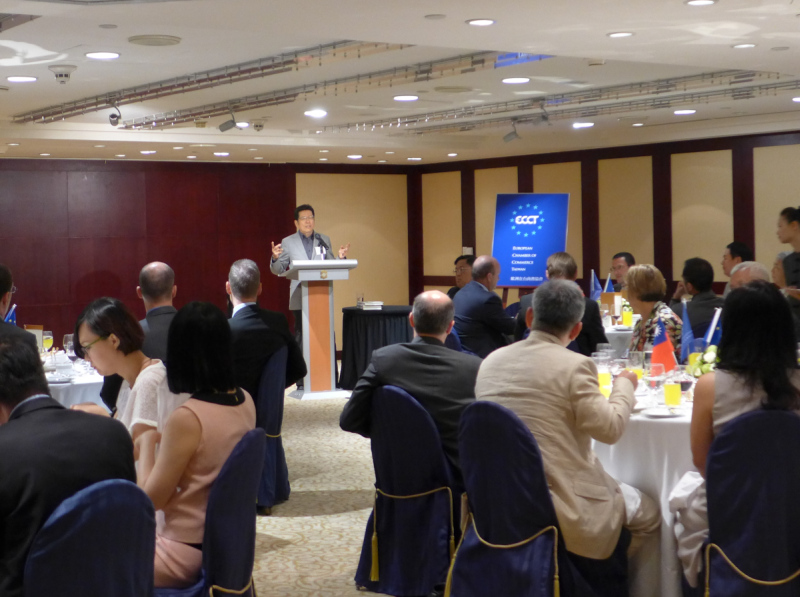A holistic vision for Taiwan's society and tourism

On 29 August, the ECCT hosted guest speaker Stanley Yen, Chairman of The Landis Group at a Premium Event lunch.
Yen is known as the godfather of Taiwan's travel and tourism industry. This is a reputation gained from numerous efforts over more than 30 years to develop tourism in Taiwan and promote Taiwan as a tourist destination overseas.
Yen mentioned several examples in his speech. For example, in 1981 he first recommended to the government that they promote Taiwan's unique cuisine as a selling point to promote tourism. Shortly afterwards, Yen organized Taiwan's first culinary competition for Chinese food. He invited chefs from Taiwan and elsewhere in the region to participate. To judge the competition, he invited two American food editors. He was criticized at the time for inviting foreigners to judge Chinese food but he countered that in order to promote cuisine in Taiwan, you need to spread the word globally. He was vindicated because since then, those editors have written numerous articles about Taiwan and its cuisine, according to Yen. In that first competition, of the ten finalists, seven were from Taiwan and all of them went on to have successful careers and some became famous.
Yen also started organizing conferences in Taiwan in the 1990s, a time when there were very few conference facilities in Asia. At the time, he said he urged the government to invest in more facilities. However, that period was marked by Taiwan's rise as a major manufacturer and exporter of electronic goods and the government did not see the need to develop conference and exhibition facilities. Yen said that it was ironic that the government in recent years has been expanding and developing facilities but that it is 20 years too late because other countries in the region have overtaken Taiwan and now it will be difficult to catch up.
Yen is passionate about preserving Taiwan's cultural and environmental heritage. He described the east coast of Taiwan as the last unspoilt part of the island, equivalent to a national treasure. He has been a vocal opponent of the idea of building a new highway on the east coast because of the environmental and social impact. This does not imply he does not want more tourists to visit Taitung. On the contrary, he has lobbied the government to introduce direct flights from Hong Kong to Taitung, for example. But he is concerned about the danger of destroying the region's cultural heritage. Any kind of development needs to be in the interests of the local community, he said.
Yen's group has foregone the option of developing land or building new resorts in the area around Taitung. Instead, he is devoting his efforts to help the local people.
Yen said he set up The Alliance Cultural Foundation in 2009 to act as a platform to realise his vision for a vibrant and sustainable society. Using Taitung as a testing ground, Yen hopes it can become a symbol of hope and a model for Taiwan's future development. The key elements of the vision are a respect for people and the environment. This implies giving people the opportunities and skills to develop their potential, to ensure that development has a minimal impact on the environment and also preserves and enhances the essential characteristics of Taiwan's unique cultural heritage.
Yen is concerned by the decline of populations in aboriginal villages, which are now populated only by the very old and the very young as a large chunk of the working age population has migrated to the cities to work. He wants to rejuvenate aboriginal communities in Taitung and he is working to create opportunities for the community. For example, he is helping locals to start small businesses and set up vocational schools to teach valuable skills. Instead of promoting the development of large hotels, which spoil the environment and block the view, Yen is teaching locals how to set up and run B&Bs, skills which are not taught at Taiwan's hotel and hospitality curriculums. Unlike the type of development designed for short, sight-seeing package tours, the B&B experience would attract tourists that want to immerse themselves in a uniquely Taiwan experience that combines warm hospitality, cultural relics, spectacular scenery and extraordinary cuisine, all enjoyed at a leisurely pace. The foundation has also built a place for talented local singers and musicians to perform and is supporting local artists.
Yen criticized the online social networking phenomenon whereby people waste so much time on trivial communication, referring to studies which show that increased online social networking may actually make people unhappy. People need the human touch and experience, he said.
Yen conceded that Taiwan has many problems to resolve. He believes Taiwan is too insular and needs to be more international. He is also greatly concerned about abuse of government subsidies, misallocation and overspending of limited government funds. Citing the educational system as one example, he noted that Taiwan has far too many universities. Many will have to be closed. Taking painful decisions will take courage on the part of leaders, he said. Yet Yen is ultimately optimistic. He believes that Taiwan is a beacon of hope and an example, especially for China given that Taiwanese people have freedom of speech, association and religion.
